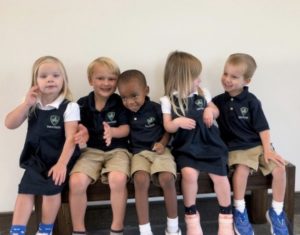 At Saint Paul’s Episcopal School, we focus on developing the spiritual, intellectual, creative and physical gifts of our children while also teaching them to be responsible members of their community. Saint Paul’s currently offers the following preschool programs for children ages 2-6 (children ages 3 and up must be potty-trained):
At Saint Paul’s Episcopal School, we focus on developing the spiritual, intellectual, creative and physical gifts of our children while also teaching them to be responsible members of their community. Saint Paul’s currently offers the following preschool programs for children ages 2-6 (children ages 3 and up must be potty-trained):
- PreK 2 – children aged 2 by Sept. 1: 2-day, 3-day, & 5-day programs
- PreK 3 – children aged 3 by Sept. 1: 2-day, 3-day, & 5-day programs
- PreK 4 – children aged 4 by Sept. 1: 3-day & 5-day programs
- Transitional Kindergarten and Intermediate TK – children who would benefit from advanced instruction to get ready for kindergarten: 5-day program
Classes are offered Monday- Friday, from 8:00 am – 2:30 pm. Children may be dropped off in our Commons Area for precare in the morning any time after 7:30 am. Students will be taken from precare to their classrooms at 8:00 for school start. For those families needing extended hours in the afternoons, aftercare is available each day from 2:30 until 5:30 pm for an additional fee; any student not picked up by 2:30 will go into aftercare and charges will be applied. Saint Paul’s Episcopal School follows the Prosper ISD school calendar for student holidays as well as inclement weather delays/closings.
Areas of Instruction
The preschool program at Saint Paul’s provides a safe, loving, collaborative environment in which students are encouraged to thrive, each at their own pace. Our low student – teacher ratio of 8:1 allows a strong relationship between the student and teacher, allowing children to flourish. Based on contemporary best practices for Pre-K and Kindergarten, our curriculum provides a readiness foundation to equip our students to be successful in Kindergarten and beyond. Our teachers utilize multiple sources to extend and enrich every student’s experience in the following areas:
- Language Arts – Pre-reading, pre-writing and listening skills as well as expressive and receptive language development; letter and word identification; relationship of objects to words; recognition of consonant and vowel sounds; rhythm and tone; memory skills; sound differentiation; language patterns; sound awareness; word recognition
- Math– Shape and number recognition; valuation; sequencing; classification; making comparisons; counting; patterning; graphing data; spatial relationships
- Science/Environment– Exploration of the natural and mechanical world: sequencing: methods of classification; making comparisons; making and evaluating predictions; observation of relationships between characteristics of objects like shape, size; gathering data and drawing conclusions; measurements and weights; physics
- Social Studies/Cultural– Multicultural awareness; civic structure; careers; social skills; manners; role play of familiar situations; family and community roles; problem solving; developing self-confidence; teamwork; language skills; introduction to basic Spanish vocabulary (numbers, colors, etc.)
- Art – Creativity; imagination; design; expression of ideas; experimentation; Hand-eye coordination; fine-motor skills
- Music– Self-expression; creativity; exploration of rhythms and patterns; sound recognition
- Movement/Physical Education– Fine and gross motor skills, physical activity and team work through games and guided activities; physical strength and health; balance; body awareness
- Technology– An introduction to the computer as a tool for learning; keyboarding; mouse familiarization; reinforce curriculum content
- Religion and Service– Daily chapel; prayer; foster a spirit of giving through service outreach
